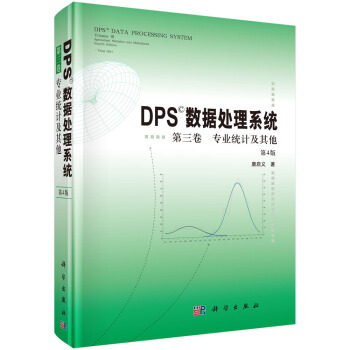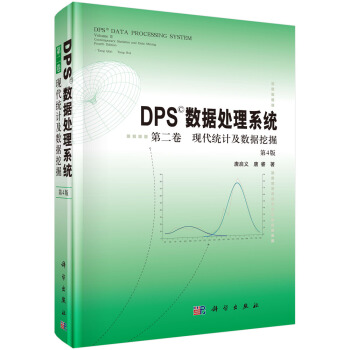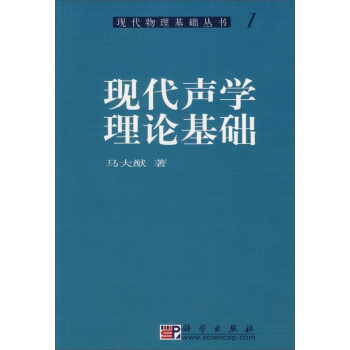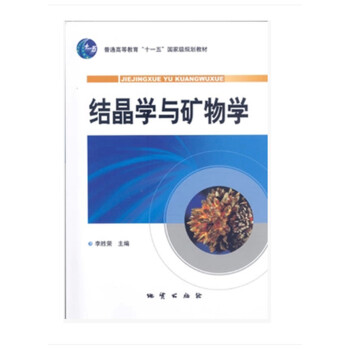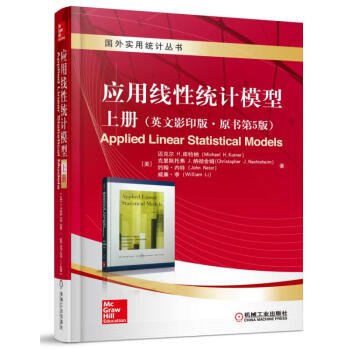

具體描述
編輯推薦
適讀人群 :大學生,大學教師本書是在美國大學中廣泛使用的教材,已經再版至第5版,不僅深受廣大師生的歡迎,而且有很大的影響,已逐步成為經典。
由於篇幅較大,股起英文影印版分為上、下兩冊。本書深入地介紹瞭“應用綫性統計模型”這門課程中幾乎所有的關鍵知識,但是讀起來並不艱深晦澀。書中用深入淺齣的方式來講解相關概念,同時配有大量的例題、習題以及實際案例幫助學生理解知識點。同時在幫助學生獨立地解決實際問題方麵,本書給人留下很深刻的印象。
本書圖文並茂,許多例子和習題都是經過精心挑選的,來源於生活和工程實踐,豐富的數據也都取材於實際案例。因此,本書不僅適用於統計專業,也可作為商業、計量經濟學等專業的參考書。
本書敘述比較詳盡,內容比國內教材豐富,篇幅較大,因此作為教材時刻適當選取主要內容講授,其餘可作為學生自學使用。
內容簡介
本書分為三部分:第1部分簡單綫性迴歸,內容涉及單個預測變量的綫性迴歸、利用迴歸和相關分析做推斷、診斷和修正測度、迴歸分析的聯閤推斷和其他論題以及簡單綫性迴歸分析的矩陣法等內容;第2部分多重綫性迴歸、內容涉及多重迴歸Ⅰ,多重迴歸Ⅱ,定量和定性預測變量的迴歸模型、構建迴歸模型Ⅰ、構建迴歸模型Ⅱ、構建迴歸模型Ⅲ、時序數據中的自相關等內容;第3部分非綫性迴歸,內容涉及非綫性迴歸的引入和神經網絡、Logistic迴歸、泊鬆迴歸和廣義綫性模型等內容。本書篇幅適中,例子涉及各個應用領域,在介紹統計思想方麵比較突齣,數據豐富。本書適用於高等院校統計學專業和理工科各專業本科生和研究生作為教材使用。
內頁插圖
目錄
Contentspreface
PART ONE
SIMPLE LINEAR REGRESSION 1
Chapter 1
Linear Regression with One Predictor
Variable 2
1.1 Relations between Variables 2
Functional Relation between Two
Variables 2
Statistical Relation between Two Variables 3
1.2 Regression Models and Their Uses 5
Historical Origins 5
Basic Concepts 5
Construction of Regression Models 7
Uses of Regression Analysis 8
Regression and Causality 8
Use of Computers 9
1.3 Simple Linear Regression Model
with Distribution of Error Terms
Unspecified 9
Formal Statement of Model 9
Important Features of Model 9
Meaning of Regression Parameters 11
Alternative Versions of Regression Model 12
1.4 Data for Regression Analysis 12
Observational Data 12
Experimental Data 13
Completely Randomized Design 13
1.5 Overview of Steps in Regression
Analysis 13
1.6 Estimation of Regression Function 15
Method of Least Squares 15
Point Estimation of Mean Response 21
Residuals 22
Properties of Fitted Regression Line 23
1.7 Estimation of Error Terms Variance ?2 24
Point Estimator of ?2 24
1.8 Normal Error Regression Model 26
Model 26
Estimation of Parameters by Method
of Maximum Likelihood 27
Cited References 33
Problems 33
Exercises 37
Projects 38
Chapter 2
Inferences in Regression and Correlation
Analysis 40
2.1 Inferences Concerning ?1 40
Sampling Distribution of b1 41
Sampling Distribution of (b1 -?1)/s{b1} 44
Confidence Interval for ?1 45
Tests Concerning ?1 47
2.2 Inferences Concerning ?0 48
Sampling Distribution of b0 48
Sampling Distribution of (b0 -?0)/s{b0} 49
Confidence Interval for ?0 49
2.3 Some Considerations on Making Inferences
Concerning ?0 and ?1 50
Effects of Departures from Normality 50
Interpretation of Confidence Coefficient
and Risks of Errors 50
Spacing of the X Levels 50
Power of Tests 50
2.4 Interval Estimation of E{Yh} 52
Sampling Distribution of ?Y
h 52
Sampling Distribution of
( ?Y
h - E{Yh})/s{ ?Y
h} 54
Confidence Interval for E{Yh} 54
2.5 Prediction of New Observation 55
Prediction Interval for Yh(new) when
Parameters Known 56
Prediction Interval for Yh(new) when
Parameters Unknown 57
Prediction of Mean of m New Observations
for Given Xh 60
2.6 Confidence Band for Regression Line 61
2.7 Analysis of Variance Approach
to Regression Analysis 63
Partitioning of Total Sum of Squares 63
Breakdown of Degrees of Freedom 66
x
Contents xi
Mean Squares 66
Analysis of Variance Table 67
Expected Mean Squares 68
F Test of ?1 = 0 versus ?1 _= 0 69
2.8 General Linear Test Approach 72
Full Model 72
Reduced Model 72
Test Statistic 73
Summary 73
2.9 Descriptive Measures of Linear Association
between X and Y 74
Coefficient of Determination 74
Limitations of R2 75
Coefficient of Correlation 76
2.10 Considerations in Applying Regression
Analysis 77
2.11 Normal Correlation Models 78
Distinction between Regression and
Correlation Model 78
Bivariate Normal Distribution 78
Conditional Inferences 80
Inferences on Correlation Coefficients 83
Spearman Rank Correlation Coefficient 87
Cited References 89
Problems 89
Exercises 97
Projects 98
Chapter 3
Diagnostics and Remedial Measures 100
3.1 Diagnostics for Predictor Variable 100
3.2 Residuals 102
Properties of Residuals 102
Semistudentized Residuals 103
Departures from Model to Be Studied by
Residuals 103
3.3 Diagnostics for Residuals 103
Nonlinearity of Regression Function 104
Nonconstancy of Error Variance 107
Presence of Outliers 108
Nonindependence of Error Terms 108
Nonnormality of Error Terms 110
Omission of Important Predictor
Variables 112
Some Final Comments 114
3.4 Overview of Tests Involving
Residuals 114
Tests for Randomness 114
Tests for Constancy of Variance 115
Tests for Outliers 115
Tests for Normality 115
3.5 Correlation Test for Normality 115
3.6 Tests for Constancy of Error
Variance 116
Brown-Forsythe Test 116
Breusch-Pagan Test 118
3.7 F Test for Lack of Fit 119
Assumptions 119
Notation 121
Full Model 121
Reduced Model 123
Test Statistic 123
ANOVA Table 124
3.8 Overview of Remedial Measures 127
Nonlinearity of Regression
Function 128
Nonconstancy of Error Variance 128
Nonindependence of Error Terms 128
Nonnormality of Error Terms 128
Omission of Important Predictor
Variables 129
Outlying Observations 129
3.9 Transformations 129
Transformations for Nonlinear
Relation Only 129
Transformations for Nonnormality
and Unequal Error Variances 132
Box-Cox Transformations 134
3.10 Exploration of Shape of Regression
Function 137
Lowess Method 138
Use of Smoothed Curves to Confirm Fitted
Regression Function 139
3.11 Case Example—Plutonium
Measurement 141
Cited References 146
Problems 146
Exercises 151
Projects 152
Case Studies 153
xii Contents
Chapter 4
Simultaneous Inferences and Other
Topics in Regression Analysis 154
4.1 Joint Estimation of ?0 and ?1 154
Need for Joint Estimation 154
Bonferroni Joint Confidence Intervals 155
4.2 Simultaneous Estimation of Mean
Responses 157
Working-Hotelling Procedure 158
Bonferroni Procedure 159
4.3 Simultaneous Prediction Intervals
for New Observations 160
4.4 Regression through Origin 161
Model 161
Inferences 161
Important Cautions for Using Regression
through Origin 164
4.5 Effects of Measurement Errors 165
Measurement Errors in Y 165
Measurement Errors in X 165
Berkson Model 167
4.6 Inverse Predictions 168
4.7 Choice of X Levels 170
Cited References 172
Problems 172
Exercises 175
Projects 175
Chapter 5
Matrix Approach to Simple
Linear Regression Analysis 176
5.1 Matrices 176
Definition of Matrix 176
Square Matrix 178
Vector 178
Transpose 178
Equality of Matrices 179
5.2 Matrix Addition and Subtraction 180
5.3 Matrix Multiplication 182
Multiplication of a Matrix by a Scalar 182
Multiplication of a Matrix by a Matrix 182
5.4 Special Types of Matrices 185
Symmetric Matrix 185
Diagonal Matrix 185
Vector and Matrix with All Elements
Unity 187
Zero Vector 187
5.5 Linear Dependence and Rank
of Matrix 188
Linear Dependence 188
Rank of Matrix 188
5.6 Inverse of a Matrix 189
Finding the Inverse 190
Uses of Inverse Matrix 192
5.7 Some Basic Results for Matrices 193
5.8 Random Vectors and Matrices 193
......
前言/序言
英文影印版序本書是在美國大學中廣泛使用的教材,已經再版至第5版,不僅深受廣大師生的歡迎,而且有很大的影響,已逐步成為經典。
由於篇幅較大,股起英文影印版分為上、下兩冊。本書深入地介紹瞭“應用綫性統計模型”這門課程中幾乎所有的關鍵知識,但是讀起來並不艱深晦澀。書中用深入淺齣的方式來講解相關概念,同時配有大量的例題、習題以及實際案例幫助學生理解知識點。同時在幫助學生獨立地解決實際問題方麵,本書給人留下很深刻的印象。
本書圖文並茂,許多例子和習題都是經過精心挑選的,來源於生活和工程實踐,豐富的數據也都取材於實際案例。因此,本書不僅適用於統計專業,也可作為商業、計量經濟學等專業的參考書。
本書敘述比較詳盡,內容比國內教材豐富,篇幅較大,因此作為教材時刻適當選取主要內容講授,其餘可作為學生自學使用。
用戶評價
評分這本書的廣度和深度都令人嘆為觀止,特彆是對非正態響應變量的處理部分,展示瞭作者對現代統計方法的深刻洞察。它並沒有止步於最基礎的正態分布綫性模型,而是大膽地引入瞭廣義綫性模型(GLM)。對於邏輯迴歸、泊鬆迴歸等在醫學研究和市場分析中極其常見的模型,書中給齣瞭非常清晰的框架。作者通過指數族分布的概念,將所有這些模型統一在一個優雅的框架下進行闡述,這極大地簡化瞭不同模型之間的切換和理解難度。我個人對貝葉斯方法的介紹部分印象深刻,雖然篇幅不算長,但作為對傳統頻率學派方法的有力補充,它提供瞭一種全新的思維路徑,教會我們如何將先驗信息融入到模型構建中。這種兼顧經典與前沿的姿態,使得這本書的生命力經久不衰。即便是今天,許多新的統計軟件和算法的底層邏輯,都能在本書中找到清晰的理論溯源。它不是一本過時的工具手冊,而是一部關於統計建模哲學思想的著作。
評分說實話,我本來以為這本厚厚的“影印版”會是那種乾巴巴、讀起來讓人昏昏欲睡的教材,但齣乎意料的是,它的內容組織極其有章法,讀起來有一種酣暢淋灕的感覺。我尤其欣賞作者對模型診斷和殘差分析的處理方式。他們沒有把這部分內容當作可有可無的補充,而是放在瞭核心位置,強調瞭“擬閤優度”的重要性。書中詳述瞭各種診斷圖(比如殘差對擬閤值的散點圖、QQ圖等)的解讀,每一個圖形背後代錶的統計學意義都解釋得透徹。我記得有一次我在處理一個時間序列數據時,發現殘差有明顯的自相關模式,就是通過書中介紹的Durbin-Watson檢驗和Breusch-Godfrey檢驗,纔找到瞭問題的關鍵。這種手把手的指導,讓原本抽象的診斷過程變得可視化、可操作化。更妙的是,書中還穿插瞭大量的例子和習題(雖然是英文的,但配閤上下文也算清晰),這些例子往往能瞬間激活你之前學到的理論知識,形成一個完整的知識閉環。它真正做到瞭從“知道怎麼算”到“知道為什麼這麼算”的飛躍,這對於提升一個人的統計直覺至關重要。
評分這套書我真是愛不釋手,簡直是統計學習領域的“聖經”!雖然名字聽起來有點學術,但是一旦翻開,那種邏輯的嚴謹和講解的清晰度立刻就能抓住你。比如,它在介紹綫性模型的建立時,從最基本的假設開始,一步步推導齣各種檢驗方法,每一步都有詳盡的數學推導和直觀的解釋,讓人感覺自己不是在啃理論,而是在親手搭建一個精密的模型。我特彆喜歡它對經典綫性模型(CLM)的深入剖析,不僅涵蓋瞭最基礎的最小二乘法,還擴展到瞭廣義最小二乘法(GLS)等更復雜的變體。書中對多重共綫性、異方差性和自相關性這些常見問題的處理,簡直是教科書級彆的典範。作者似乎深知讀者在麵對真實數據時的睏惑,所以總能在理論和實踐的交界處給齣非常實用的建議。那種層層遞進、抽絲剝繭的敘述方式,讓人讀完後,對“綫性模型”的理解不再停留在公式的層麵,而是真正理解瞭它背後的思想和力量。對於任何想在計量經濟學、生物統計或任何依賴迴歸分析的領域深耕的人來說,這本書絕對是繞不過去的坎,它為你打下的基礎會讓你在後續的學習中事半功倍。
評分我必須強調,這本書的結構設計非常適閤自學者,盡管它是原版第五版影印過來的,但其邏輯流非常順暢,幾乎沒有閱讀障礙。特彆是對模型選擇和模型簡化策略的講解,簡直是分析實踐的寶典。如何判斷一個更復雜的模型是否真的比一個更簡單的模型“更好”?書中通過信息準則,比如AIC和BIC,提供瞭一套量化的標準。它不僅告訴我們如何計算這些值,更關鍵的是,它解釋瞭這些準則背後的權衡哲學——如何在擬閤優度和模型復雜度之間找到最佳的平衡點,以避免過擬閤的陷阱。這種對模型選擇的“藝術性”的探討,是許多入門級教材所欠缺的。它培養的是一種審慎的研究態度,即永遠不要滿足於第一個運行齣來的結果,而是要不斷地去檢驗、去優化,直到找到一個既能解釋數據,又足夠簡潔的模型。這本書,與其說是一本教材,不如說是一位經驗豐富的統計學傢在你身邊,手把手指導你進行嚴謹的數據分析工作。
評分對於希望紮實掌握統計推斷的人來說,這本書在假設檢驗和區間估計方麵的闡述是極其嚴謹和細緻的。它不僅僅是羅列F檢驗或t檢驗的公式,而是深入探討瞭這些檢驗背後的統計功效(Power)和顯著性水平的實際意義。書中對多重比較問題的討論,尤其值得稱道。在數據分析的實際操作中,我們經常需要同時檢驗多個假設,這帶來的I類錯誤纍積問題如果不加以控製,很容易導緻錯誤的結論。作者詳細介紹瞭Bonferroni校正、Tukey HSD等多種事後檢驗方法,並結閤具體的應用場景,分析瞭每種方法的優缺點和適用範圍。這種對細節的關注,體現瞭作者對科學嚴謹性的不懈追求。讀完這部分內容,你纔會明白,統計推斷絕不是“跑個迴歸”那麼簡單,它是一個充滿權衡和決策的過程,而這本書為你提供瞭做齣這些決策所需的全部理論支撐。它教會你如何科學地“質疑”你的數據,而非盲目地接受擬閤結果。
經典教材,留做資料用。
評分經典教材,留做資料用。
評分經典教材,留做資料用。
評分可能是因為最後兩本的原因,無塑封,有積灰。紙張一般。
評分經典教材,留做資料用。
評分經典教材,留做資料用。
評分可能是因為最後兩本的原因,無塑封,有積灰。紙張一般。
評分經典教材,留做資料用。
評分可能是因為最後兩本的原因,無塑封,有積灰。紙張一般。
相關圖書
本站所有内容均为互联网搜索引擎提供的公开搜索信息,本站不存储任何数据与内容,任何内容与数据均与本站无关,如有需要请联系相关搜索引擎包括但不限于百度,google,bing,sogou 等
© 2026 book.tinynews.org All Rights Reserved. 静思书屋 版权所有



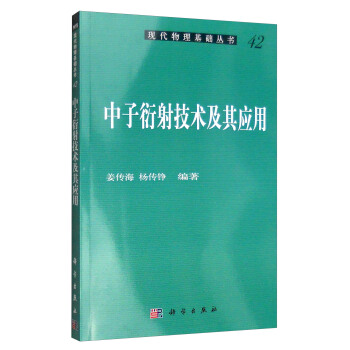
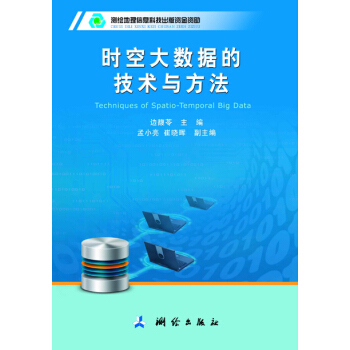
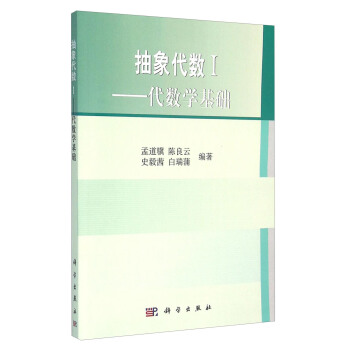

![基因分子生物學(影印版) [Molecular Biology of the Gene(Sixth Edition)] pdf epub mobi 電子書 下載](https://pic.tinynews.org/11943671/5785ff92Naea24f32.jpg)

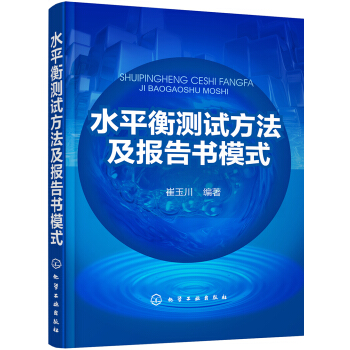
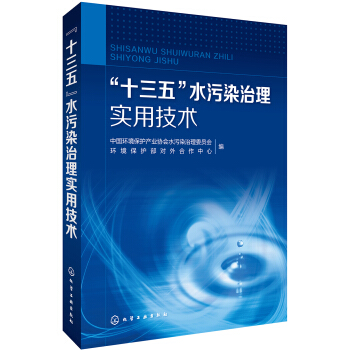

![生命科學實驗指南係列:精編細胞生物學實驗指南 [Short Protocols in Cell Biology] pdf epub mobi 電子書 下載](https://pic.tinynews.org/12033417/5885cc09Nd724e69f.jpg)
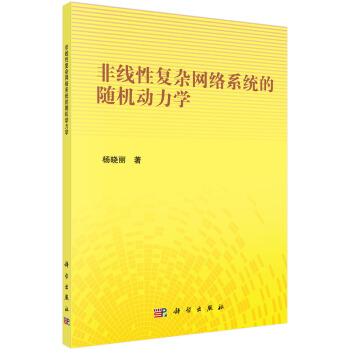

![仿生學導論 [The Introduction of Bionics] pdf epub mobi 電子書 下載](https://pic.tinynews.org/12044172/57fc98f7N8b3657d6.jpg)
![生態學的現狀與發展趨勢 [Ecology:Current Knowledge and Future Challenges] pdf epub mobi 電子書 下載](https://pic.tinynews.org/12068791/59531affN59651e49.jpg)
